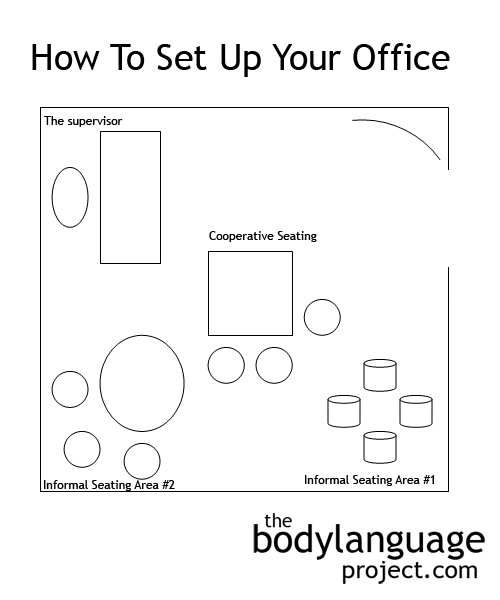
Low ranking employees are forced to face the wall so the boss can watch them work without being noticed himself.
Another method to protect and reserve space is to pull a desk away from a wall as it cuts other people off from using that space. Outward facing desks leave plenty of space in a room where someone might sneak up from behind or from the side. Higher status workers will turn their desks so they facing doorways or entryways to avoid surprise intrusions. This simplest ways to perform a status check is to verify the way in which people face. If they face a wall there is a good chance they are lower status, but if they face the door and can easily see people enter their office, then they are likely higher status. The orientation of the window and door also has an effect on how things are set up and depending on the uneasiness of a particular person will depend on which orientation they prefer. Usually there is a balance between looking out the window to enjoy the view it provides and monitoring the door. The highest ranking workers will have private offices with controlled entry, or in other words a secretary.
It is important to put some thought into how desks are used since they can dictate how a meeting might unfold. A desk between two forward facing people forms a barrier which then leads into a formal meeting even when it’s not intended. If the goal is to create less confrontation and foster team building, than meetings should take place without a desk, or with circular or even square tables. Space permitting, circular tables should be included in the office environment to permit informal meetings if desired. Having room for more than one meeting area sends a powerful nonverbal message to those visiting since it shows that your occupation warrants it, even if they are only rarely used.
Placing chairs kitty-corner at a rectangular desk or positioning two chairs at forty-five degrees to the table on the same side can be effective if the goal is to hold cooperative meetings. Every office should be set-up in a manner that suits its main purpose, however, contingencies should be made for rare occasions when alternative strategies need to be implemented. If the idea is to quickly build friendships rather than demonstrate authority, it would be wise to have a more informal setting, perhaps even a comfortable sofa and coffee table with casual furnishings. It is no accident when a high powered lawyer organizes rows upon rows of legal books to his back. His message is clear; I have the knowledge to back me. What non verbal message does your office convey?

